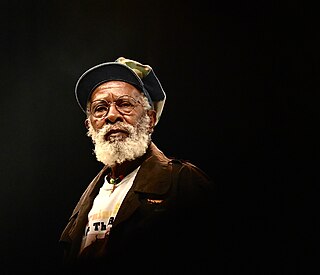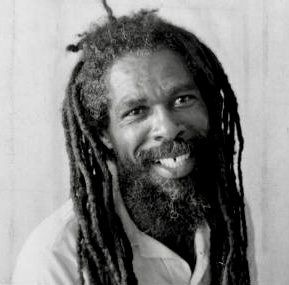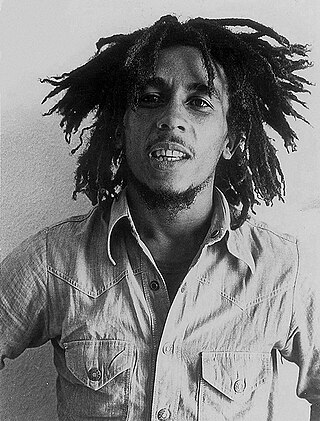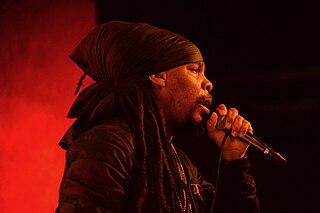Related Research Articles

Reggae is a music genre that originated in Jamaica during the late 1960s. The term also denotes the modern popular music of Jamaica and its diaspora. A 1968 single by Toots and the Maytals, "Do the Reggay", was the first popular song to use the word reggae, effectively naming the genre and introducing it to a global audience. Reggae is rooted out from traditional Jamaican Kumina, Pukkumina, Revival Zion, Nyabinghi, and burru drumming. Jamaican reggae music evolved out of the earlier genres mento, ska and rocksteady. Reggae usually relates news, social gossip, and political commentary. It is instantly recognizable from the counterpoint between the bass and drum downbeat and the offbeat rhythm section. The immediate origins of reggae were in ska and rocksteady; from the latter, reggae took over the use of the bass as a percussion instrument.

Rastafari is an Abrahamic religion that developed in Jamaica during the 1930s. It is classified as both a new religious movement and a social movement by scholars of religion. There is no central authority in control of the movement and much diversity exists among practitioners, who are known as Rastafari, Rastafarians, or Rastas.

Winston Rodney OD, better known by the stage name Burning Spear, is a Jamaican roots reggae singer-songwriter, vocalist, and musician. Burning Spear is a Rastafarian and one of the most influential and long-standing roots artists to emerge from the 1970s.

Bad Brains are an American rock band formed in Washington, D.C., in 1976. They are widely regarded as pioneers of hardcore punk, though the band's members have objected to the use of this term to describe their music. They are also an adept reggae band, while later recordings featured elements of other genres like funk, heavy metal, hip hop, and soul. Rolling Stone magazine called them "the mother of all black hard-rock bands", and they have been cited as a seminal influence to numerous other subgenres in addition to hardcore punk, including various subgenres of heavy metal, such as thrash/speed metal, alternative metal, and funk metal. Bad Brains are followers of the Rastafari movement.
The Bobo Ashanti, also known as the Ethiopian African Black International Congress (E.A.B.I.C.), is a religious group originating in Bull Bay near Kingston, Jamaica.
Steel Pulse are a roots reggae band from the Handsworth area of Birmingham, England. They originally formed at Handsworth Wood Boys School, and were composed of David Hinds, Basil Gabbidon, and Ronald McQueen (bass); along with Basil's brother Colin briefly on drums and Mykaell Riley. Steel Pulse were the first non-Jamaican act to win the Grammy Award for Best Reggae Album. Collectively the band has won one Grammy award with nine nominations.

Clifton George Bailey III, better known by his stage name Capleton, is a Jamaican reggae and dancehall musician. He is also referred to as King Shango, King David, The Fireman and The Prophet. His record label is called David House Productions. He is known for his Rastafari views expressed in his songs.

Lucky Philip Dube was a South African reggae musician and Rastafarian. His record sales across the world earned him the Best Selling African Musician prize at the 1996 World Music Awards. In his lyrics, Dube discussed issues affecting South Africans and Africans in general to a global audience. He recorded 22 albums in a 25-year period and was Africa's best-selling reggae artist of all time. Dube was murdered in the Johannesburg suburb of Rosettenville on the evening of 18 October 2007.

Mansions of Rastafari is an umbrella term for the various groups of the Rastafari movement. Such groups include the Bobo Ashanti, the Niyabinghi, the Twelve Tribes of Israel, and several smaller groups, including African Unity, Covenant Rastafari, Messianic Dreads, SeeGold Empire, and the Selassian Church. The term is taken from the Biblical verse in John 14:2, "In my Father's house are many mansions."
Allan Hope CD, better known as Mutabaruka, is a Jamaican Rastafari dub poet, musician, actor, educator, and talk-show host, who developed two of Jamaica's most popular radio programmes, The Cutting Edge and Steppin' Razor. His name comes from the Rwandan language and translates as "one who is always victorious". His themes include politics, culture, Black liberation, social oppression, discrimination, poverty, racism, sexism, and religion.
A prophet is a person who is believed to speak through divine inspiration.

Keith Anderson CD, better known by the stage name Bob Andy, was a Jamaican reggae vocalist and songwriter. He was widely regarded as one of reggae's most influential songwriters.

Robert Nesta Marley was a Jamaican singer, songwriter, and guitarist. Considered one of the pioneers of reggae, he fused elements of reggae, ska and rocksteady and was renowned for his distinctive vocal and songwriting style. Marley increased the visibility of Jamaican music worldwide and made him a global figure in popular culture. He became known as a Rastafarian icon, and he infused his music with a sense of spirituality. Marley is also considered a global symbol of Jamaican music and culture and identity and was controversial in his outspoken support for democratic social reforms. Marley also supported the legalisation of cannabis and advocated for Pan-Africanism.

Cedric "Im" Brooks was a Jamaican saxophonist and flautist known for his solo recordings and as a member of The Mystic Revelation of Rastafari, The Sound Dimensions, Divine Light, The Light of Saba, and The Skatalites.

Alberto D'Ascola, better known by his stage name Alborosie, is an Italian reggae artist. He is sometimes called the "Italian Reggae Ambassador".

Omar "Tarrus" Riley is a Jamaican-American reggae singer and member of the Rastafari movement.

Turbulence is a Jamaican reggae artist. He is a self-proclaimed member of the Rastafari movement. He was discovered in 1999 by Philip "Fatis" Burrell. He has released a number of albums including I Believe, United, Notorious - The Album, Songs of Solomon, Triumphantly, Join Us and Hail The King and was featured in an episode of the BBC documentary series Storyville. He is also known for his song "Blood dem out" which was featured on a highly profiled freestyle ski movie called "Show and Prove".
Nyabinghi, also Nyahbinghi, Niyabinghi, Niyahbinghi, is the gathering of Rastafari people to celebrate and commemorate key dates significant to Rastafari throughout the year. It is essentially an opportunity for the Rastafari to congregate and engage in praise and worship. For example, on July 23 of each year, a Nyabinghi is held to celebrate the birth of Emperor Haille Selassie I. During a Nyabinghi celebration men and women have different roles and expectations. Men are expected to remove any hair coverings, whilst women must keep their hair covered. A group of men typically organise themselves in a line or semi-circle and are assigned to beat the drums throughout. The remaining congregation continue to sing well known songs or 'chants', some of which are Hebraic scriptural verses that evidence the divinity of Haile Sellassie. For example, 'I have a little light in I and I'm going to make it shine, Rastafariiii, shine' and 'Holy Mount Zion is a holy place and no sinners can enter there, so let the words of my mouth and the mediation of my heart, be acceptable in thy sight, of Rastafari'. Nyabinghi is a Rastafari tradition that promotes Rastafari unity, strengthens the Rastafari spirit with fellowship and raises the consciousness and presence of Rastafafari in the heart of those in attendance. At some points passages of the bible are read. Rastafari recognise the significance of Jesus Christ, due to Haile Sellassie I fulfilling the teachings and prophecy of scripture. Nyah Bingi came before Rastafari Nyah is the Highest

Winston Hubert McIntosh, professionally known as Peter Tosh, was a Jamaican reggae musician. Along with Bob Marley and Bunny Wailer, he was one of the core members of the band the Wailers (1963–1976), after which he established himself as a successful solo artist and a promoter of Rastafari. He was murdered in 1987 during a home invasion.
Musah Haruna is a Ghanaian Afrobeat and Reggae musician, known by his stagename Friction. Friction is the founder and former leader of the legendary Ghanaian Hiplife Music Group VIP. This group has become one of Ghana's most well known Hiplife music groups, and subject of documentaries such as HomeGrown: Hiplife in Ghana and the book The Hiplife in Ghana: West African Indigenization of Hip-Hop. Friction released two albums with VIP, 'Ye De Aba' and 'Bibi Baa O', and Friction and his group became a nationwide phenomenon. In the year 2000 Friction featured in Ghana's national HIV Campaign song 'Stop AIDS, Love Life' among other Ghanaian music stars such as Reggie Rockstone and Black Prophet.
References
- 1 2 "Black Prophet". wereldjournalisten.nl. August 10, 2009. Archived from the original on 5 August 2016. Retrieved 16 June 2016.
- ↑ "Information About the Artist / Band" . Retrieved 16 June 2016.
- ↑ "Black Prophet still going strong". Ghana Web. 22 October 2008. Retrieved 16 June 2016.
- ↑ "Black Prophet and Thunder Strike Band". African Music Safari. Archived from the original on 12 May 2021. Retrieved 16 June 2016.
{{cite web}}: CS1 maint: unfit URL (link) - ↑ Nyarko, Scholastica (5 May 2007). "Black Prophet goes solo with Legal Stranger". The Statesman. Archived from the original on 12 March 2012. Retrieved 16 June 2016.
- ↑ "Black Prophet Launches Maiden Album". Morden Ghana. 2007-12-12. Retrieved 2008-11-03.
- Aglanu Dela Ernest (2009), "Black Prophet, the reggae prophet with a prophecy" Ghana Nation 8-24-2009 Retrieved March 10, 2011